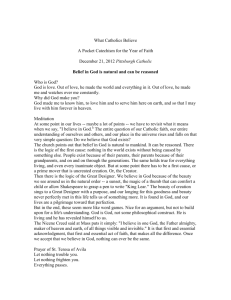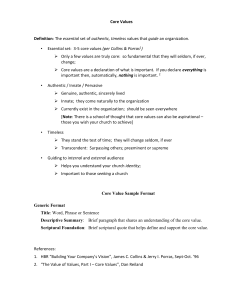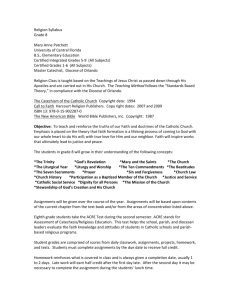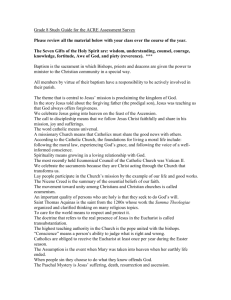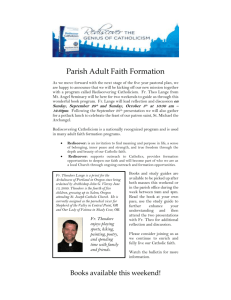CATHOLIC HIGHER EDUCATION
advertisement
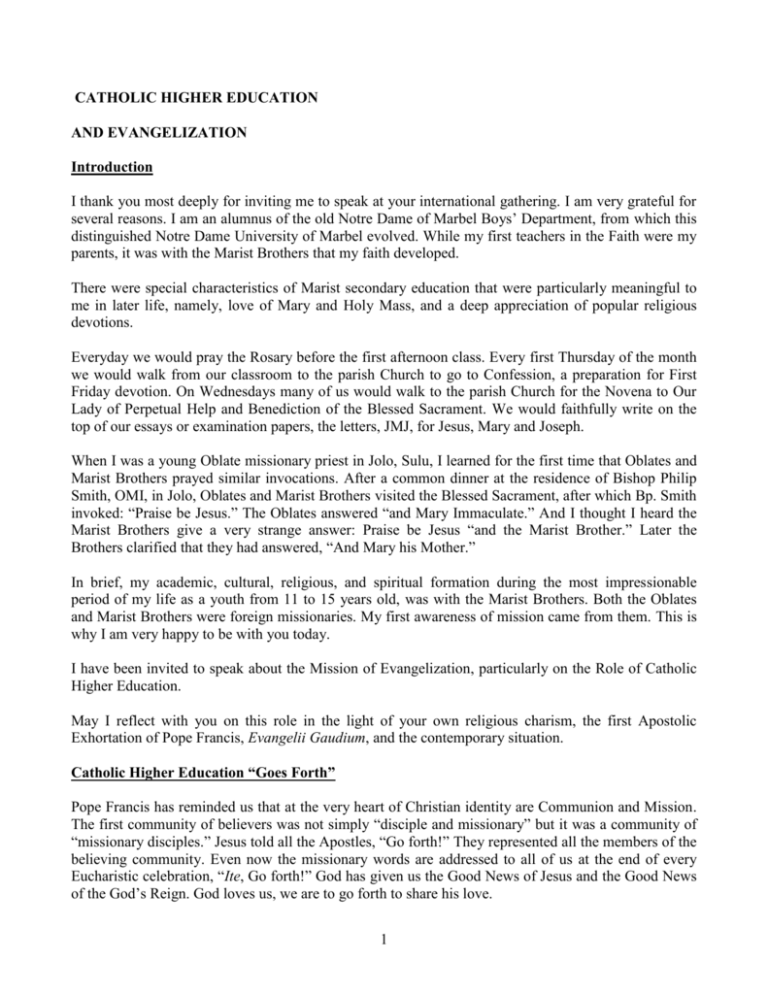
CATHOLIC HIGHER EDUCATION AND EVANGELIZATION Introduction I thank you most deeply for inviting me to speak at your international gathering. I am very grateful for several reasons. I am an alumnus of the old Notre Dame of Marbel Boys’ Department, from which this distinguished Notre Dame University of Marbel evolved. While my first teachers in the Faith were my parents, it was with the Marist Brothers that my faith developed. There were special characteristics of Marist secondary education that were particularly meaningful to me in later life, namely, love of Mary and Holy Mass, and a deep appreciation of popular religious devotions. Everyday we would pray the Rosary before the first afternoon class. Every first Thursday of the month we would walk from our classroom to the parish Church to go to Confession, a preparation for First Friday devotion. On Wednesdays many of us would walk to the parish Church for the Novena to Our Lady of Perpetual Help and Benediction of the Blessed Sacrament. We would faithfully write on the top of our essays or examination papers, the letters, JMJ, for Jesus, Mary and Joseph. When I was a young Oblate missionary priest in Jolo, Sulu, I learned for the first time that Oblates and Marist Brothers prayed similar invocations. After a common dinner at the residence of Bishop Philip Smith, OMI, in Jolo, Oblates and Marist Brothers visited the Blessed Sacrament, after which Bp. Smith invoked: “Praise be Jesus.” The Oblates answered “and Mary Immaculate.” And I thought I heard the Marist Brothers give a very strange answer: Praise be Jesus “and the Marist Brother.” Later the Brothers clarified that they had answered, “And Mary his Mother.” In brief, my academic, cultural, religious, and spiritual formation during the most impressionable period of my life as a youth from 11 to 15 years old, was with the Marist Brothers. Both the Oblates and Marist Brothers were foreign missionaries. My first awareness of mission came from them. This is why I am very happy to be with you today. I have been invited to speak about the Mission of Evangelization, particularly on the Role of Catholic Higher Education. May I reflect with you on this role in the light of your own religious charism, the first Apostolic Exhortation of Pope Francis, Evangelii Gaudium, and the contemporary situation. Catholic Higher Education “Goes Forth” Pope Francis has reminded us that at the very heart of Christian identity are Communion and Mission. The first community of believers was not simply “disciple and missionary” but it was a community of “missionary disciples.” Jesus told all the Apostles, “Go forth!” They represented all the members of the believing community. Even now the missionary words are addressed to all of us at the end of every Eucharistic celebration, “Ite, Go forth!” God has given us the Good News of Jesus and the Good News of the God’s Reign. God loves us, we are to go forth to share his love. 1 Such was the case of Fr. Marcellin Champagnat. God so loved him that he set forth to share that love with others. Impelled by his experience of a dying man, he founded the Marist Brothers. He wanted to educate the young, especially the needy, so that they might love and follow Jesus. How his charism is being carried out by Marist Brothers for almost 200 years, short of three years (1817 – 2 017), is well known in every place and in every heart which they have touched. Today the mission to evangelize confronts a grave contemporary situation. Discernment of the challenges will help Marist Brothers in higher education to discern the proper responses. My presentation will raise questions for you but will not give any answer. Preliminary Note: Identity and Mission of Catholic Institutions of Higher Education See Apostolic Constitution, Ex Corde Ecclesiae, JP 2 (1990) A Christian inspiration not only of individuals but of the university community as such; A continuing reflection in the light of the Faith upon the growing treasury of human knowledge Fidelity to the Christian message, Institutional Commitment to the service of the people and of the human family. CONTEMPORARY CHALLENGES TO MISSION The Challenge of Culture The Vision-Mission Statement of Notre Dame of Marbel University states that the University aims to form young people to be competent and ….. while respecting and preserving Filipino culture. Culture is pervasive. We are born into it. We live by it. We are educated within it. We work in it. We die and are buried in it. We are never without culture. It is a way of life, a way of thinking and speaking, of understanding and emoting, of valuing, behaving, and relating. Culture explains many differences between individuals, between social classes and groups, races and nationalities. Even if a Chinese has lived in the Philippines for years, or even if born here, he or she will always have traits that are distinctively Chinese. So, too, Muslims, Christians, Hindus, Buddhists, or Indigenous Peoples Culture is not static. A cultural development takes place as the product of regular interaction. The interaction between cultures goes on all the time, quietly, subtly, surely. A foreigner living in the Philippines will slowly and without deliberation develop character traits that are Filipino – to speak like a Filipino, to eat like a Filipino, even to think like a Filipino. But in the light of the mission to evangelize, culture and its development are ambivalent. There are values within cultures that do not reflect the Gospel or the Kingdom of God. Let me cite extreme cases, e.g., where a cultural tradition of patriarchy considers women as inferior to men. They are subjected to abuse and are deprived of certain human rights, such as education, even the right to life. Millions of fetuses are aborted every year simply because they are female. For this reason, cultural preservation should not be slavish. Cultural transformation is often necessary. In our Catholic tradition, such cultural transformation takes place in the process of inculturating the Gospel into a particular culture. Purification as well as mutual enrichment takes place in the dynamics of inculturation. 2 The question is how catholic higher education can assist in such cultural transformation in the light of Good News of Jesus and of the Kingdom of God. It would also be imperative to consider that nonCatholics and non-Christians go to Catholic colleges, not to be formed as Catholics or to imbibe a Catholic spirit, but to be formed as persons of faith, or persons of religious experience. Some visionmission statements of Catholic colleges and universities might need revisiting, since they might be articulated without openness to the different religious traditions that students hold. This is especially true for colleges with Muslim students. The Challenge of an Emerging Global Secular Culture In intercultural interaction a disturbing concern for colleges and universities would be the almost inexorable force of secularism in the world. Secularism as we know goes back to the Age of Enlightenment, the Age of Reason, and the Industrial Revolution. French deists and agnostics exalted Reason and Science over Faith and Revelation. They asserted that there was no universal truth except those arrived at by reason and science. Thus was born the “modern spirit” of secularism and materialism. Reason and natural law substituted for faith and revelation as the basis of universal truth as well as morality. Its positive contributions to human dignity, human rights, freedom and democracy, interconnectedness, new forms of human solidarity, as well as the rapid advance of science and technology are undeniable and have benefited humankind immensely. In subsequent centuries, the modern spirit would become the spirit of Europe and the developed world. The more science unraveled the mysteries of life and the universe, the less was it necessary for God to be the explanation of why things are what they are. Religion and objective morality as faith understands it would not longer serve as everyday norms of conduct. Religious faith, symbols and practices would be gradually ejected from the State policy and eventually from the public sphere. In the second half of the 20th century, a radical reaction to the modern spirit began to appear. It rejected the idea that there are absolute universal truths (meta-narratives) either from reason, science, or faith. Truth is subjective, personal, and relative. Truth is contingent, changeable, from culture to culture, individual to individual. One can choose sets of truth according to one’s orientation. Much of truth will depend on public opinion. The changing nature of truth accounts for the evolution of opinions regarding ethical issues, such as those related to life, gender, marriage, commitments, life and death. Such is the “post-modern spirit.” It has radicalized the modern spirit even more and dismissed religion and faith-based morality as archaic and irrelevant. The post-modern spirit challenges to the extreme the mission of Catholic higher education. How do educators teach Gospel and Kingdom values to the young who are daily formed in values by intercultural encounter via informal “educators”? How are faith-based moral values to be formed? How can authentic inculturation of the Gospel take place in such secular and materialistic situation? The Challenge of the Tools of Social Communication 3 Social observers opine that the tools of social communication are now the prime formator of values. And the values they transmit are secular and materialist. We face the seemingly limitless force of Mass media to influence minds and values. Television, cinema, computers, mobile phones, tablets, ipads, and other constantly changing modes of social communication are creating reality out of virtuality. The virtual reality of the digital age is now the reality of young minds. They learn values of love, friendship, human relationships, marriage, life and death from virtual reality. Unevangelized mass media become dictators of value. But the major question is how can Catholic educators make use of the tools of social communication in such a way that they become positive evangelizers? How do Catholic colleges and universities evangelize the practitioners of mass media? How will they produce graduates who can ‘go forth” and change the world of social communications with the Gospel and Kingdom values they have learned? The Challenge of Ecology God’s creation under siege Environmental degradation Natural disasters – drought, floods, soil erosion, landslides Global warming and climate change Stewardship of creation, the greening of universities? The Challenge of Poverty The Marist religious charism of educating the young to love and follow Jesus has a special option -option for the poor and needy. Pope Francis speaks of such an option as of paramount importance for the Church to return to its roots and renew its vision. At the beginning of the Church was poverty. Jesus himself was poor, born poor from a poor family. He was an itinerant preacher with no home to call his own. His first disciples and Apostles were from the poor. He reversed the values of Jewish society by calling the poor, not sinners, but “blessed.” This was the very first of the Beatitudes, the magna carta, of the Kingdom of God, the keys to fidelity in discipleship. The criteria for entry into the Kingdom were not about riches, power, or public fame, but about solidarity with the poor, the needy, the deprived, the oppressed. The community of believers which followed Jesus was the beginning of the theological term, the “Church of the Poor.” All of us, rich and poor, in the Church are to have evangelical poverty, to be poor in spirit, and to place what we have at the service of the Reign of God. The paradigm of such poverty is Jesus himself, the God-made-poor so that we might become rich with God’s blessing. He is the Compassion of God who hears the cry of the poor and reaches out to them in active solidarity for their integral liberation. We are reminded again and again that option for the poor is an “obligatory option.” Some questions can be raised. How do Marist colleges and universities demonstrate option for the poor in their teaching, research, and community outreach? Not for the sake of humanitarianism or philanthropy but for the integral liberation of the poor from material poverty? Are scholarships for the 4 poor a sufficient answer? Would the setting up of a congregational solidarity fund for the education of the poor help? How about the formation of young men and women from the elite classes of society towards “option for the poor”? How can we make our many educational projects for street children, for the homeless, for indigenous peoples, etc., empowering and enabling? The Challenge of Women and Youth the shades and shapes of the feminist movement – rereading history, faith, morality, metanarratives patriarchy “the feminine genius” Need for relational equality in daily life The youth as present and future Influence of the post-modern spirit Accompaniment and empowerment Forming Persons of Engaged Faith Such questions bring us to the core of the Catholic educational enterprise – the formation of a committed and engaged faith, the formation of an integral faith. The faith of graduates of Catholic higher education often lacks depth. It remains anchored on religious duties and not on mission. It becomes easy prey to the preaching of “bible-believing” teachers. Individualistic faith fails to see the social dimension of the Gospel of Jesus. It does not have the power for social transformation. It does not impel the person to be engaged in movements of justice and peace, to be committed responsible stewards of creation. Ritualism, externalism, and pietism hinder the development of a “faith that does justice.” And the social teachings of the Church remain its “best kept secret.” But what we see worldwide is a separation of faith from life. We do not practice what we believe. According to Gaudium et Spes, the dichotomy between faith and life is one of the “gravest errors of modern times.” Given the situation of faith, how can Marist institutions of higher learning form integral faith? How can they help their students from the lure of preachers who can attract and converts them by simply citing the Bible? How do you form a “faith that does justice”? How do you form a faith that matters everyday, a faith that is lived and transformative? Renewing the Cultures of Business and Politics Pope Francis speaks of financial systems that exclude and marginalize the poor, of economic theories that consider the poor as the lowest and last of those who are benefited by economic development. He speaks of models of development that breed even greater social and economic inequality. The unholy partnership between business and politics can be observed all over the world. It is a symbiotic relationship that benefits each other. 5 The rich are politically powerful, and the powerful are also rich. In such a situation, corruption is not far behind as public funds are siphoned off for private use rather than for the common good and for the development of the poor. This is why Pope Francis prays: “I beg the Lord to grant us more politicians who are generally disturbed by the state of society, the people, the lives of the poor!” (EG, no. 205). Many alumni of Catholic higher education go into business and politics. How we form them in school so that they would hearts that are truly concerned with the plight of the poor? How do form persons of transparency, accountability, and integrity? How do we persuade people of competence and integrity to enter politics, not to be trapped by the political system but to transform it by leadership and example for the common good, especially for the development of the poor? Forming Persons of Dialogue – For Peace and Harmony In the light of recurring conflicts and tensions, religious, ethnic, racial, States, terrorism, clash of cultures: Dialogue - a form of encounter o Martin Buber – dialogue as the perquisite of authentic relationship between man and man, and between man and God – dialogic relations. o Pope Francis – dialogue with the State, with society incl. culture, between faith, science, and reason. Requirements: o Recognition of human dignity and human rights o Mutual respect and understanding o Openness of mind and heart o Trust and Love o Building consensus o Building a community in diversity Dialogue in Higher Education o Role modeling of dialogue o Inter-cultural dialogue: of life, of sharing experience of theological exchanges. o Building a Culture of Justice and Peace Catholic Colleges and Universities as Community – a Paradigm for the Wider Society God’s presence in the midst of a pluralist college community the reality of community the reality of harmony in diversity of values the reality of constant human, religious, academic, cultural formation of intercultural interaction +Orlando B. Cardinal Quevedo, O.M.I. Archbishop of Cotabato Notre Dame of Marbel University November 10, 2014 6
